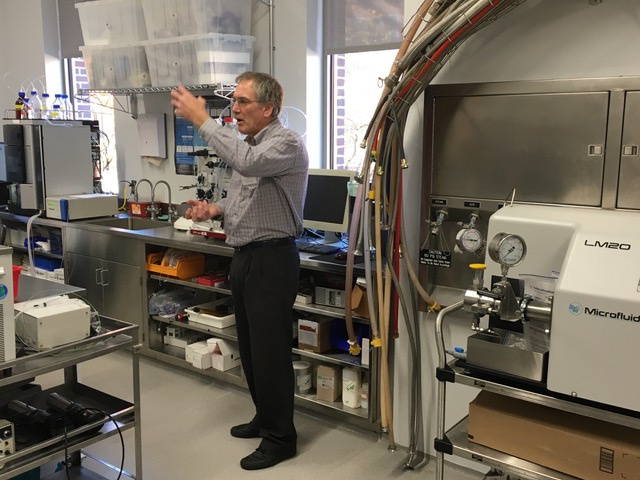
Peering into Penn State’s fermentation facility
Mark Signs, co-director of Penn State’s CSL Behring Fermentation Facility, provides an overview of the facility’s equipment and capabilities to tour participants. (Photo by Paul Nicolaus)
A writer checks in after a ScienceWriters2019 lab tour.
The wide world of biotechnology encompasses an array of fields and applications, but what is industrial biotechnology? During a tour offered Oct. 28 by Penn State University as part of the ScienceWriters2019 conference, a group of science writers learned that industrial biotechnology applies techniques of molecular biology to industrial, health, and societal challenges.
After seeing an assortment of shiny, state-of-the-art equipment up close and hearing about the complex processes involved, I asked how the work that takes place at Penn State’s CSL Behring Fermentation Facility might be summed up. It’s using natural organisms as “little factories,” replied Mark Signs, co-director of the facility, “to make what we want them to make.” These efforts include the growth of a wide range of cells as well as the production or purification of microbe-derived products such as industrial enzymes, bio-based chemicals, biofuels, and recombinant proteins.
During our visit, for example, Penn State faculty member Melik Demirel provided an overview of his work developing self-healing materials using a recombinant version of a squid protein. The protein, which is found in the suckers that line squid tentacles, has potential applications in specialized products such as underwater diving gear and space suits. It could also be used to develop sustainable alternatives to plastic. Demirel is a professor of engineering science and mechanics and director of the university’s Center for Research on Advanced Fiber Technologies (CRAFT).
The fermentation facility was initiated in 2017 with a monetary gift from the biopharmaceutical company CSL Behring and donations from two equipment suppliers, GEA North America and Sartorius Stedim Biotech. Its equipment and expertise are made available to university, government, and industry researchers interested in fermentation or related technologies, the faculty said. And students benefit from hands-on experience with equipment that is used in biotech research and manufacturing facilities, we were told, which preps them for potential careers in bioscience.